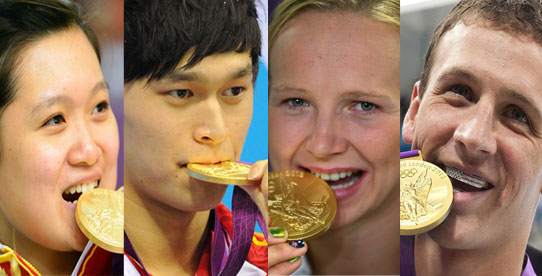Less gold in Olympic medals
- By Xu Lin
 0 Comment(s)
0 Comment(s) Print
Print E-mail China.org.cn, July 31, 2012
E-mail China.org.cn, July 31, 2012
|
|
|
Athletes are biting their gold medals after winning the games in London Olympics. |
Although the prices of gold and silver have now reached a record high in the history of the international market, the value of the London Olympic medals are not as high as might be expected, Information Times reported.
During the London Olympics, a total of 2,300 medals will be awarded over the course of 302 events. The gold medal is the heaviest in Olympic history, weighing in at over 400g.
When the Beijing Olympics were held in 2008, the price of gold items on the New York Gold Market was still under US$800. That fee, however, has doubled by today. Despite its heavy weight, the gold medal for the London Olympics is not the one with the highest value in history.
The gold medal is made up of 92.5 percent silver and 1.34 percent gold (a minimum of 6g of gold), and the remainder is copper, holding a total value of about US$650. The silver medal is made up of 92.5 percent silver and the remainder is copper, with a value of US$335. The bronze medal is made up of 97 percent copper, 2.5 percent zinc and 0.5 percent tin, carrying a worth of US$5; less than the price of a cheeseburger in most areas of the world.
In comparison, the gold medal’s value during the 1980 Winter Olympics in Lake Placid, U.S., was much higher: about US$1,000.
Yet no matter how much the medals are worth, the Olympic champions are more than eager to hang them around the neck as a token of their success and joy.
Many athletes like to sink their teeth into the gold medals after being awarded with them, yet one should never bite down too hard. The medal only has a thin golden coating and even one bite may very well reduce its value.







Go to Forum >>0 Comment(s)